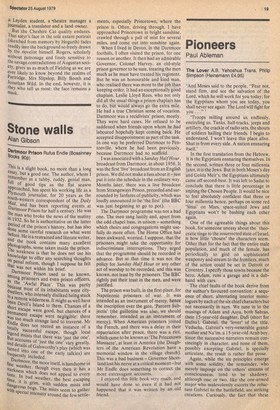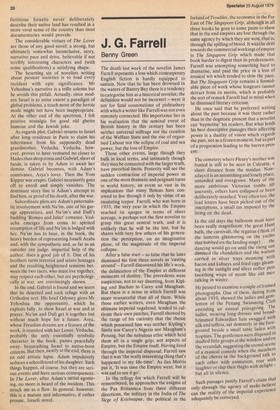Pioneers
Paul Ableman
The Lover A.B. Yehoshua Trans. Philip Simpson (Heinemann £4.95)
'And Moses said to the people, "Fear not, stand firm, and see the salvation of the Lord, which he will work for you today; for the Egyptians whom you see today, you shall never see again. The Lord will fight for 'Troops milling around us endlessly. encircling us. Tanks, half-tracks, jeeps and artillery, the crackle of radio sets, the shouts of soldiers hailing their friends. I begin to understand, I won't leave this place alive. Shut in from every side. A nation ensnaring itself.'
In the first translation from the Hebrew, it is the Egyptians ensnaring themselves. In the second, written three or four millennia later, it is the Jews. But in both Moses's day and Golda Meir's, the Egyptians ultimately came off second-best. It was left to Sadat to conclude that there is little percentage in smiting the Chosen People. It would be nice to feel absolutely confident that three or four millennia hence, perhaps on some red 'Sinai' on Mars, space-suited Jews and Egyptians won't be bashing each other again.
One of the agreeable things about this book, for someone uneasy about the theocratic tinge to the resurrected state of Israel, is how little 'chosen' the characters seem. Other than for the fact that the entire male population, and much of the female, has periodically to gird on sophisticated weaponry and stream to the frontiers, much of the action could be set in Detroit or Coventry. I specify those towns because the hero, Adam, runs a garage and is a dabhand with cars.
The chief faults of the book derive from the author's favoured convention: a sequence of short, alternating interior monologues by each of the six chief characters but not necessarily in turn. We tune in to the musings of Adam and Asya, both Sabras, their 15-year-old daughter, Dafi (short for Dafna), Gabriel, the 'lover' of the title, Veducha, Gabriel's very-venerable grandmother and Na'im, a 15-year-old Arab boy. Since the successive narrators remain convincingly in character, and none of them, possibly excepting Gabriel, is specially articulate, the result is rather flat prose.
Again, while the six principles emerge with some solidity, the remainder, who merely impinge on the others' streams of consciousness, tend to be shadowy, although one or two, like the one-armed major who malevolently escorts the reluctant Gabriel to the battlefield, are striking creations. Curiously, the fact that these fictitious Israelis never deliberately describe their native land has resulted in a more vivid sense of the country than most documentaries would provide.
The considerable virtues of The Lover are those of any good novel: a strong, but ultimately somewhat inconclusive, story, narrative pace and drive, believable if not terribly interesting characters and (with some qualifications) a satisfying shape.
The besetting sin of novelists writing about pioneer societies is to load every incident with epic significance. Mr Yehoshua's narrative is a trifle solemn but he avoids this pitfall. Actually, since modern Israel is to some extent a paradigm of global problems, a touch more of the heroic mode might not have been inappropriate. At the other end of the spectrum. I felt positive nostalgia for good old ghetto humour and the Jewish joke.
As regards plot. Gabriel returns to Israel after longresidence in Paris to claim his inheritance from his supposedly dead grandmother, Veducha. Veducha, however, proves to have ventured no closer to Hades than deep coma and Gabriel, short of funds, is taken in by Adam to await her demise. Gabriel becomes, with Adam's connivance. Asya's lover. Then the Yom Kippur war erupts. Gabriel necessarily goes off to enroll and simply vanishes. The dominant story line is Adam's attempt to find him, or proof of his death, after the war.
Subordinate plots are Adam's paternalistic involvement with Na'im, one of his garage apprentices, and Na'im's and Dafi's budding 'Romeo and Juliet' romance. Veducha emerges from coma to spirited resumption of life and Na'im is lodged with her. Na'im has to bear, in the book, the heavy burden of representing Israeli Arabs and, with the sympathetic and, as far as an outsider can judge, impartial help of the author, does a good job of it. One of his brothers turns terrorist and seizes hostages and the resulting, heightened tensions between the two races, who must live together, may respect each other, but are psychologi • cally at war, are convincingly shown.
In the end, Gabriel is found and we learn that he deserted and took refuge with an Orthodox sect. His brief Odyssey gives Mr Yehoshua the opportunity, which he exploits fully, to show Israel at war and at prayer: Na'im and Dafi get it together but without much hope for a future. Asya, whose Freudian dreams are a feature of the work, is reunited with her Lover. Veducha, probably the only essentially symbolic character in the book, passes peacefully away, bequeathing Israel to native-born citizens. But then, nearly at the end, there is an odd artistic lapse. Adam impulsively seduces a schoolfriend of his daughter. Such things happen, of course, but they are serious events and have serious consequences. In The Lover, after Adam's initial agonising, no more is heard of the incident. This struck me as a flaw. In general, however, this is a mature and informative, if rather prosaic, Israeli novel.































 Previous page
Previous page